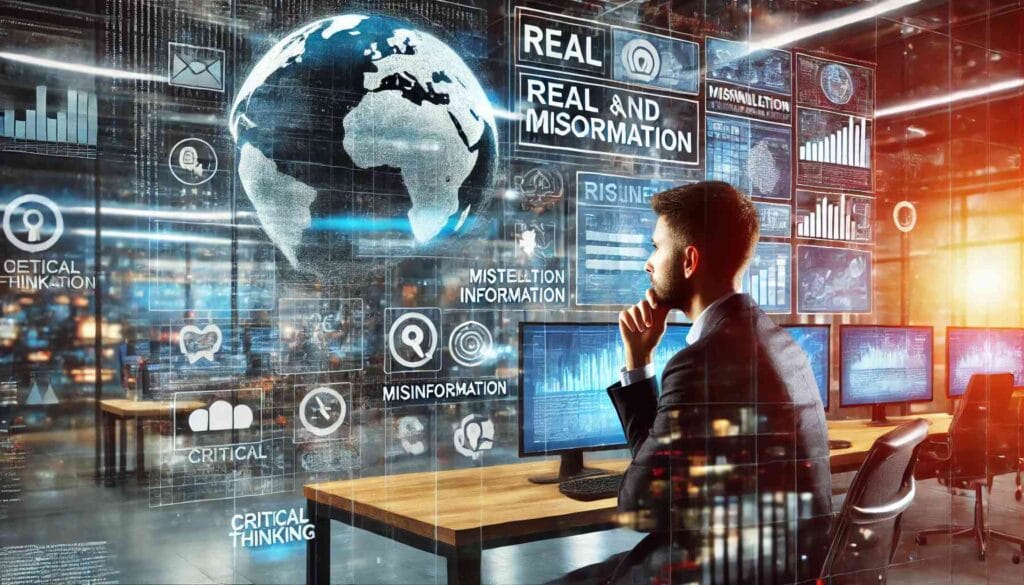How Critical Thinking Skills Can Save You in a World Full of Misleading Information

In today’s digital age, we are constantly bombarded with information from countless sources. Social media, news outlets, blogs, and even personal conversations are filled with data, opinions, and claims. While this abundance of information can be empowering, it also poses a significant challenge: how do we distinguish between what is true, what is misleading, and what is outright false? This is where critical thinking skills become essential. They act as a mental shield, helping us navigate the complexities of the information landscape and make informed decisions. Here’s how critical thinking can save you in a world full of misleading information.
1. Understanding Critical Thinking
Critical thinking is the ability to analyze, evaluate, and interpret information objectively and logically. It involves questioning assumptions, identifying biases, and considering alternative perspectives. Rather than accepting information at face value, critical thinkers actively engage with it, seeking evidence and reasoning to support or refute claims. This skill is not innate; it requires practice and intentional development.
2. The Problem of Misleading Information
Misleading information comes in many forms: fake news, biased reporting, clickbait headlines, manipulated statistics, and even well-intentioned but inaccurate advice. The consequences of falling for such information can range from minor misunderstandings to significant real-world impacts, such as poor decision-making, spreading misinformation, or even harm to oneself or others. In a world where misinformation can spread faster than ever, critical thinking is a vital tool for self-preservation.
3. How Critical Thinking Helps
Critical thinking equips you with the tools to evaluate information effectively. Here’s how it can help you navigate the information overload:
- Questioning Assumptions: Critical thinkers don’t take things for granted. They ask questions like, “What is the source of this information?” “What evidence supports this claim?” and “Are there alternative explanations?” By questioning assumptions, you can avoid being misled by unverified or biased claims.
- Identifying Biases: Everyone has biases, including the creators of the information you consume. Critical thinking helps you recognize these biases, whether they are political, cultural, or personal. Understanding the perspective of the source allows you to assess the information more objectively.
- Evaluating Evidence: Not all evidence is created equal. Critical thinkers assess the quality and relevance of evidence before accepting a claim. They look for reliable sources, peer-reviewed studies, and data that has been rigorously tested.
- Recognizing Logical Fallacies: Misleading information often relies on logical fallacies—errors in reasoning that make an argument seem convincing even when it’s flawed. Critical thinkers can spot these fallacies, such as ad hominem attacks, straw man arguments, or false dichotomies, and avoid being swayed by them.
- Considering Multiple Perspectives: Critical thinking encourages you to look at issues from different angles. By considering diverse viewpoints, you gain a more comprehensive understanding of the topic and are less likely to be misled by one-sided narratives.
4. Practical Steps to Develop Critical Thinking
Developing critical thinking skills is a lifelong process. Here are some practical steps to get started:
- Stay Curious: Cultivate a mindset of curiosity. Ask questions, seek out new information, and be open to learning. The more you know, the better equipped you’ll be to evaluate new information.
- Verify Sources: Always check the credibility of the source. Is it a reputable organization? Does the author have expertise in the field? Are there citations or references to back up the claims?
- Fact-Check: Use fact-checking websites and tools to verify information. Cross-reference claims with multiple reliable sources to ensure accuracy.
- Practice Reflection: Take time to reflect on your own beliefs and assumptions. Are they based on evidence, or have you accepted them without question? Self-awareness is a key component of critical thinking.
- Engage in Debate: Discussing ideas with others, especially those who hold different viewpoints, can sharpen your critical thinking skills. It forces you to defend your position, consider alternative perspectives, and refine your arguments.
5. The Impact of Critical Thinking
When you apply critical thinking skills, you become a more informed and discerning individual. You’re less likely to fall for scams, propaganda, or sensationalized headlines. Instead, you can make decisions based on evidence and reason, whether it’s choosing a health treatment, voting in an election, or investing in a business. Moreover, by modeling critical thinking, you can help others develop these skills, creating a more informed and rational society.
6. Conclusion
In a world overflowing with information, critical thinking is not just a useful skill—it’s a necessity. It empowers you to cut through the noise, identify misleading information, and make decisions that are grounded in truth and reason. By developing and honing your critical thinking abilities, you can protect yourself from the pitfalls of misinformation and contribute to a more informed and thoughtful world. Remember, in the age of information, the ability to think critically is your greatest defense.
Source : Medium.com




